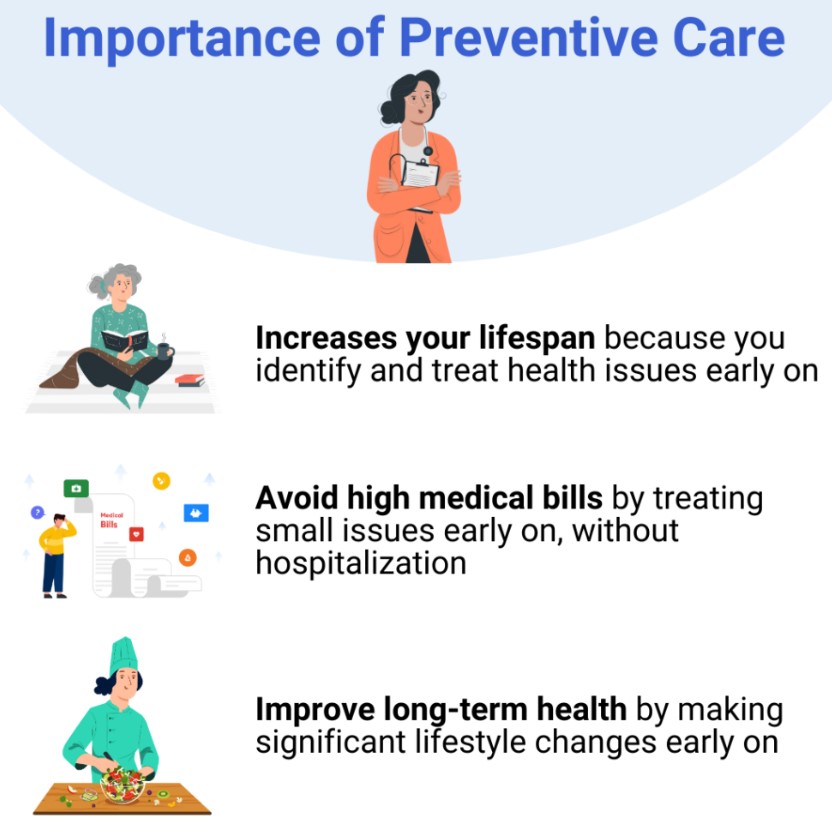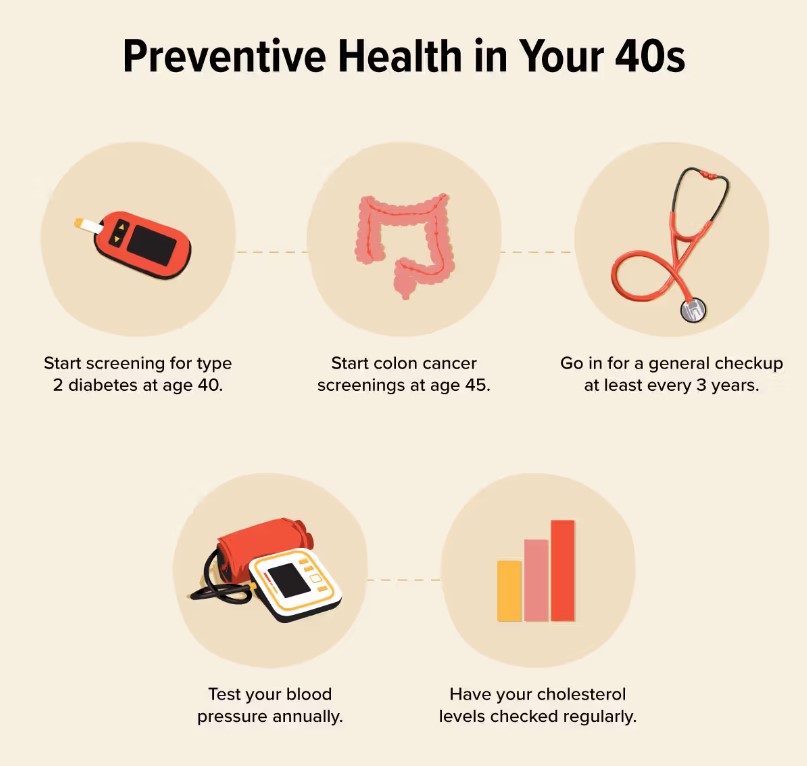Preventive Healthcare: How to Stay Healthy Long-Term
Preventive healthcare is a proactive approach that focuses on maintaining health and preventing disease before it occurs. By incorporating healthy habits, regular check-ups, and early detection into your routine, you can significantly reduce the risk of illness and enhance your long-term well-being.
Some key aspects of preventive healthcare to consider for staying healthy in the long term
Regular Medical Check-ups
- Routine screenings for blood pressure, cholesterol, and blood sugar help detect issues early.
- Cancer screenings (mammograms, colonoscopies, etc.) based on age and risk factors can lead to early diagnosis and treatment.
- Vaccinations (flu shots, COVID-19, etc.) are essential for preventing infections.
Healthy Diet
- Focus on a balanced diet rich in fruits, vegetables, lean proteins, and whole grains.
- Limit sugar, processed foods, and saturated fats, which can lead to chronic conditions like heart disease and diabetes.
- Stay hydrated and manage portion sizes.
Regular Physical Activity
- Engage in moderate exercise for at least 150 minutes a week, such as walking, swimming, or cycling.
- Strength training exercises at least twice a week can help maintain muscle mass and bone health.
- Regular physical activity reduces the risk of heart disease, obesity, and many other conditions.
Stress Management
- Chronic stress can contribute to various health problems like high blood pressure, depression, and immune system dysfunction.
- Practices like meditation, deep breathing, yoga, and hobbies can help manage stress.
Adequate Sleep
- Ensure 7-9 hours of sleep per night for optimal health and mental clarity.
- Lack of sleep can weaken the immune system, increase the risk of chronic diseases, and impair cognitive function.
Avoid Harmful Habits
- Quit smoking to reduce the risk of lung disease, heart disease, and many cancers.
- Limit alcohol consumption to moderate levels (up to one drink per day for women and two for men).
- Avoid recreational drugs and other substances that may harm your health.
Mental Health Care
- Maintain strong social connections with friends, family, or community groups.
- Seek help from a mental health professional if you're feeling overwhelmed, anxious, or depressed.
- Incorporate practices like journaling or mindfulness to foster emotional well-being.
Healthy Weight Management
- Maintaining a healthy body weight through a combination of diet and exercise can prevent conditions like type 2 diabetes, hypertension, and heart disease.
- Regular monitoring of your weight and Body Mass Index (BMI) helps ensure you stay within a healthy range.
Healthy Habits for Specific Age Groups
- Children: Vaccinations, dental care, and establishing healthy eating and exercise routines are essential.
- Adults: Screenings for cancers, diabetes, and heart disease become important.
- Seniors: Bone density tests, vision and hearing exams, and managing chronic conditions like arthritis and hypertension are crucial.
Environmental and Lifestyle Factors
- Minimize exposure to pollutants and harmful chemicals in the home and workplace.
- Use sun protection to prevent skin cancer.
- Practice safe driving and other personal safety habits to avoid injuries.
Preventive healthcare is a continuous process. Building and maintaining healthy habits, along with regular visits to healthcare professionals, can help you lead a longer, healthier life.

Preventive Healthcare: A Guide to Long-Term Health
Preventive healthcare involves proactive steps to maintain your overall health and well-being, reducing the risk of illnesses and diseases.
Some key strategies
Lifestyle Modifications:
- Balanced Diet: Prioritize a diet rich in fruits, vegetables, whole grains, lean proteins, and healthy fats.
- Regular Exercise: Aim for at least 150 minutes of moderate-intensity exercise per week.
- Adequate Sleep: Ensure you get 7-9 hours of quality sleep each night.
- Stress Management: Practice relaxation techniques like meditation, yoga, or deep breathing.
- Limit Harmful Substances: Avoid smoking, excessive alcohol consumption, and drug abuse.
Regular Check-ups:
- Annual Physicals: Schedule regular check-ups with your doctor to monitor your overall health.
- Screenings: Participate in recommended screenings for conditions like cancer, heart disease, and diabetes.
- Immunizations: Stay up-to-date on vaccinations to protect against preventable diseases.
Preventive Measures:
- Hand Hygiene: Wash your hands frequently with soap and water to prevent the spread of germs.
- Safe Practices: Follow safe practices, such as wearing a seatbelt, practicing safe sex, and using sunscreen.
- Environmental Awareness: Be mindful of your environment and take steps to reduce exposure to pollutants and toxins.
Mental Health:
- Emotional Well-being: Prioritize your mental health by seeking support, practicing mindfulness, and engaging in activities you enjoy.
- Stress Management: Develop healthy coping mechanisms for dealing with stress.
- Professional Help: If you're struggling with mental health issues, don't hesitate to seek professional help.
Remember, preventive healthcare is an ongoing process. By adopting these strategies, you can significantly improve your chances of living a long and healthy life.

